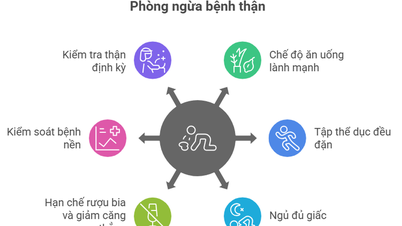Edema, hypertension, decreased urination, blood in urine, shortness of breath and cough, mild fever... are warning signs of acute glomerulonephritis.
Acute glomerulonephritis is a condition in which the glomeruli and blood vessels in the kidneys become inflamed. According to Dr. Mai Thi Hien, Head of Urology, Andrology and Nephrology at Tam Anh General Hospital in Hanoi , the disease can occur at various ages and has many causes. People with sore throats, ear infections, or skin infections caused by group A beta-hemolytic streptococci are at high risk of developing acute glomerulonephritis. The disease can also occur after pneumococcal pneumonia, endocarditis, sepsis, mumps, chickenpox, fungal infections, hepatitis B, and HIV infection. Cases caused by parasitic infections are rare.
Acute glomerulonephritis often progresses silently. Many cases are discovered incidentally during examinations for other illnesses, or through blood or urine tests showing microscopic hematuria and proteinuria. The signs and symptoms of this disease are quite varied, and manifest differently in each individual.
Here are some easily recognizable symptoms of acute glomerulonephritis.
Edema
The first sign is swelling in both legs, especially around the ankles, along with puffy eyelids and a feeling of heaviness in the face. Swelling is usually more pronounced in the morning and gradually decreases towards evening. However, this condition only lasts for about the first 10 days, after which it will subside as the patient urinates more frequently.
Besides visually observing the swelling in the leg, patients can check for edema by pressing firmly with their thumb on the tibia area around the ankle; a clear indentation will be visible and will take a long time to spring back.
Infrequent urination, changes in urine
Patients typically urinate less than 500ml per day during the first week of the illness, lasting about 3-4 days, and this may recur within the following 2-3 weeks; the urine is yellow and frothy. Blood tests show no increase in urea and creatinine, or only a slight increase. Urine tests reveal protein in the urine (proteinuria). In cases of prolonged oliguria or anuria, increased blood urea and creatinine levels increase the risk of acute glomerulonephritis progressing rapidly to chronic glomerulonephritis.
Blood in urine
This is an important sign in the diagnosis of acute glomerulonephritis. Patients may experience hematuria (blood in the urine) 1-2 times in the first week, which may reappear in the following 2-3 weeks. The frequency of hematuria gradually decreases, to about once every 3-4 days, and then stops completely.
High blood pressure
According to Dr. Hien, this manifestation accounts for about 60% of cases of acute glomerulonephritis. In children, blood pressure fluctuates around 140/90mmHg, and in adults 160/90mmHg. In some cases, blood pressure spikes and remains relatively stable for many days at around 180/100mmHg, causing severe headaches, dizziness, seizures, coma due to cerebral edema, and even death.
Shortness of breath and coughing
When the kidneys are damaged, excess fluid that cannot be eliminated accumulates in the lungs, causing fluid retention that leads to shortness of breath, coughing, and fatigue. This condition is common in people with acute glomerulonephritis with edema and usually improves after 4 weeks if treated promptly and appropriately; however, it can last for many months and become chronic if left untreated.

Patients with acute glomerulonephritis may experience coughing and shortness of breath. (Image: Freepik)
A sudden increase in circulating volume can lead to paroxysmal hypertension and acute heart failure. At this point, the patient exhibits symptoms of pulmonary edema such as shortness of breath, rapid and shallow breathing; retraction of the suprasternal notch, supraclavicular notch, and intercostal spaces; and coughing up pinkish fluid. Without prompt emergency treatment, the patient is at high risk of death.
In addition, people with acute glomerulonephritis may experience other symptoms such as a mild fever of 38-38.5 degrees Celsius, pain in the back or ribs, nighttime cramps, nausea, or vomiting...
Dr. Hien stated that with acute glomerulonephritis, patients can fully recover after 4-6 weeks of treatment. However, if not detected and treated promptly, after each acute episode, the disease can progress to chronic kidney failure and is irreversible. Patients with long-term chronic kidney failure may develop renal atrophy. Therefore, early detection to prevent the disease from progressing from the initial stages is crucial.
To prevent acute glomerulonephritis, people should maintain a healthy lifestyle and diet: practice good hygiene to minimize the risk of infections; practice safe sex; exercise regularly; have regular health checkups; control blood pressure and metabolic diseases; drink enough water; limit processed foods; and avoid salty foods. When experiencing infectious diseases such as pharyngitis or impetigo, it is necessary to see a doctor for timely treatment to avoid complications such as acute glomerulonephritis. If acute glomerulonephritis is suspected, it is necessary to go to specialized nephrology and urology clinics for treatment and appropriate dietary advice.
Trinh Mai
Source link



![[Photo] Prime Minister Pham Minh Chinh attends the Conference on the Implementation of Tasks for 2026 of the Industry and Trade Sector](/_next/image?url=https%3A%2F%2Fvphoto.vietnam.vn%2Fthumb%2F1200x675%2Fvietnam%2Fresource%2FIMAGE%2F2025%2F12%2F19%2F1766159500458_ndo_br_shared31-jpg.webp&w=3840&q=75)












































































































Comment (0)